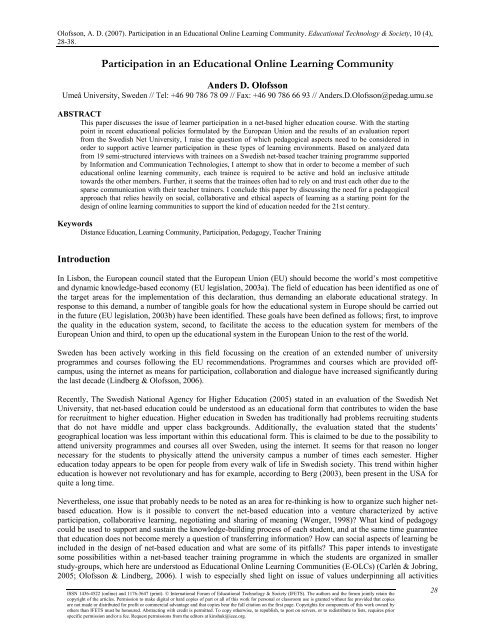October 2007 Volume 10 Number 4 - Educational Technology ...
October 2007 Volume 10 Number 4 - Educational Technology ...
October 2007 Volume 10 Number 4 - Educational Technology ...
You also want an ePaper? Increase the reach of your titles
YUMPU automatically turns print PDFs into web optimized ePapers that Google loves.
Olofsson, A. D. (<strong>2007</strong>). Participation in an <strong>Educational</strong> Online Learning Community. <strong>Educational</strong> <strong>Technology</strong> & Society, <strong>10</strong> (4),<br />
28-38.<br />
Participation in an <strong>Educational</strong> Online Learning Community<br />
Anders D. Olofsson<br />
Umeå University, Sweden // Tel: +46 90 786 78 09 // Fax: +46 90 786 66 93 // Anders.D.Olofsson@pedag.umu.se<br />
ABSTRACT<br />
This paper discusses the issue of learner participation in a net-based higher education course. With the starting<br />
point in recent educational policies formulated by the European Union and the results of an evaluation report<br />
from the Swedish Net University, I raise the question of which pedagogical aspects need to be considered in<br />
order to support active learner participation in these types of learning environments. Based on analyzed data<br />
from 19 semi-structured interviews with trainees on a Swedish net-based teacher training programme supported<br />
by Information and Communication Technologies, I attempt to show that in order to become a member of such<br />
educational online learning community, each trainee is required to be active and hold an inclusive attitude<br />
towards the other members. Further, it seems that the trainees often had to rely on and trust each other due to the<br />
sparse communication with their teacher trainers. I conclude this paper by discussing the need for a pedagogical<br />
approach that relies heavily on social, collaborative and ethical aspects of learning as a starting point for the<br />
design of online learning communities to support the kind of education needed for the 21st century.<br />
Keywords<br />
Distance Education, Learning Community, Participation, Pedagogy, Teacher Training<br />
Introduction<br />
In Lisbon, the European council stated that the European Union (EU) should become the world’s most competitive<br />
and dynamic knowledge-based economy (EU legislation, 2003a). The field of education has been identified as one of<br />
the target areas for the implementation of this declaration, thus demanding an elaborate educational strategy. In<br />
response to this demand, a number of tangible goals for how the educational system in Europe should be carried out<br />
in the future (EU legislation, 2003b) have been identified. These goals have been defined as follows; first, to improve<br />
the quality in the education system, second, to facilitate the access to the education system for members of the<br />
European Union and third, to open up the educational system in the European Union to the rest of the world.<br />
Sweden has been actively working in this field focussing on the creation of an extended number of university<br />
programmes and courses following the EU recommendations. Programmes and courses which are provided offcampus,<br />
using the internet as means for participation, collaboration and dialogue have increased significantly during<br />
the last decade (Lindberg & Olofsson, 2006).<br />
Recently, The Swedish National Agency for Higher Education (2005) stated in an evaluation of the Swedish Net<br />
University, that net-based education could be understood as an educational form that contributes to widen the base<br />
for recruitment to higher education. Higher education in Sweden has traditionally had problems recruiting students<br />
that do not have middle and upper class backgrounds. Additionally, the evaluation stated that the students’<br />
geographical location was less important within this educational form. This is claimed to be due to the possibility to<br />
attend university programmes and courses all over Sweden, using the internet. It seems for that reason no longer<br />
necessary for the students to physically attend the university campus a number of times each semester. Higher<br />
education today appears to be open for people from every walk of life in Swedish society. This trend within higher<br />
education is however not revolutionary and has for example, according to Berg (2003), been present in the USA for<br />
quite a long time.<br />
Nevertheless, one issue that probably needs to be noted as an area for re-thinking is how to organize such higher netbased<br />
education. How is it possible to convert the net-based education into a venture characterized by active<br />
participation, collaborative learning, negotiating and sharing of meaning (Wenger, 1998)? What kind of pedagogy<br />
could be used to support and sustain the knowledge-building process of each student, and at the same time guarantee<br />
that education does not become merely a question of transferring information? How can social aspects of learning be<br />
included in the design of net-based education and what are some of its pitfalls? This paper intends to investigate<br />
some possibilities within a net-based teacher training programme in which the students are organized in smaller<br />
study-groups, which here are understood as <strong>Educational</strong> Online Learning Communities (E-OLCs) (Carlén & Jobring,<br />
2005; Olofsson & Lindberg, 2006). I wish to especially shed light on issue of values underpinning all activities<br />
ISSN 1436-4522 (online) and 1176-3647 (print). © International Forum of <strong>Educational</strong> <strong>Technology</strong> & Society (IFETS). The authors and the forum jointly retain the<br />
copyright of the articles. Permission to make digital or hard copies of part or all of this work for personal or classroom use is granted without fee provided that copies<br />
are not made or distributed for profit or commercial advantage and that copies bear the full citation on the first page. Copyrights for components of this work owned by<br />
others than IFETS must be honoured. Abstracting with credit is permitted. To copy otherwise, to republish, to post on servers, or to redistribute to lists, requires prior<br />
specific permission and/or a fee. Request permissions from the editors at kinshuk@ieee.org.<br />
28

















